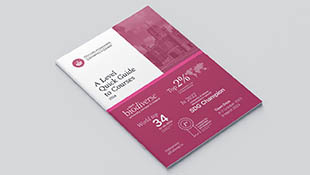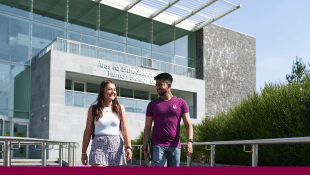-
Courses

Courses
Choosing a course is one of the most important decisions you'll ever make! View our courses and see what our students and lecturers have to say about the courses you are interested in at the links below.
-
University Life

University Life
Each year more than 4,000 choose University of Galway as their University of choice. Find out what life at University of Galway is all about here.
-
About University of Galway

About University of Galway
Since 1845, University of Galway has been sharing the highest quality teaching and research with Ireland and the world. Find out what makes our University so special – from our distinguished history to the latest news and campus developments.
-
Colleges & Schools

Colleges & Schools
University of Galway has earned international recognition as a research-led university with a commitment to top quality teaching across a range of key areas of expertise.
-
Research & Innovation

Research & Innovation
University of Galway’s vibrant research community take on some of the most pressing challenges of our times.
-
Business & Industry

Guiding Breakthrough Research at University of Galway
We explore and facilitate commercial opportunities for the research community at University of Galway, as well as facilitating industry partnership.
-
Alumni & Friends

Alumni & Friends
There are 128,000 University of Galway alumni worldwide. Stay connected to your alumni community! Join our social networks and update your details online.
-
Community Engagement

Community Engagement
At University of Galway, we believe that the best learning takes place when you apply what you learn in a real world context. That's why many of our courses include work placements or community projects.
Whilst Abroad
General Advice whilst Studying Abroad
At your destination
- Each university will have an International Office. When you arrive at your host university, find out where this is located and what its opening hours are. It should be your first point of contact for any non-academic problems you might encounter.
- Notify the host university/organisation if you have any illness, disability, or learning difficulty that should be brought to the attention of staff.
- Join a buddy programme if offered by the host university.
Safety
- Be vigilant at rail and bus stations and keep a close eye on your luggage.
- Keep valuables out of sight and keep cash and credit cards in zipped pockets or in a secure money belt worn inside your clothes.
- Find out if any areas of your host city are considered unsafe and avoid them if possible.
- Have a list of important telephone contact numbers and the number of your credit/bank card as well as the bank’s emergency number, and keep these details about your person or in a safe place, in case you are unfortunate enough to lose your wallet or mobile phone.
- If any significant incidents occur in your host country or city, make sure that your family know that you are safe. Follow any instructions given by the authorities, and if you have concerns, get in touch with staff at your host university’s international office.
- Your personal safety is vitally important. When socialising or travelling, make sure that some friend always knows of your whereabouts, and take care never to be out alone at night.
- Stay in regular contact with your family. When you travel abroad, your loved ones will be anxious to know that you have arrived safely and are settling in well. A quick phone call, text or message will put their minds at ease.
In general
- Remember that you are bound by the regulations and the code of conduct of both the host university and of University of Galway. You are ambassadors for your country and your University and it is expected that you show respect for the host country, its people and its customs.
- While you are abroad please remember to stay in regular contact with your family. When you travel abroad, your loved ones will be anxious to know that you have arrived safely and are settling in well. A quick phone call, text or message will put their minds at ease.
- The time abroad will go by more quickly than you imagine, so make the most of it. Take advantage of any events or activities that are organised for visiting students, try to integrate as best you can with domestic students, and, if you are a language student, resist the temptation to socialise with other native English speakers. Make use of any opportunities to travel at weekends or during holiday periods, and see as much as you can of the host country. An International Student Identity Card (ISIC) can be useful for obtaining reductions on travel, entertainment, sightseeing, etc.
Staying in touch with University of Galway
E-mail will be our principal means of official communication with you while you are away, and your @universityofgalway.ie address is the one that we will use for bringing you any news, e.g. messages from your College/School, advice and reminders, grant information (if applicable), etc.
Please ensure that you check your college e-mail account regularly and that you monitor your spam/junk e-mail folder too, as important messages can end up there.
Keep an eye on the International Office website for major updates. Your College/School may provide you with other weblinks or Facebook groups to keep you connected.
For Erasmus students, keep an eye on universityofgalway.ie/erasmus-programme/outgoingstudents/latestnews/
What to do in an Emergency?
If serious injury or illness occurs, immediately seek medical treatment at the closest medical facility and, if relevant, notify your host organisation staff right away – i.e. your host university or employer main contact.
- Alert your primary University of Galway College/School contact.
- Notify your personal health care provider and /or insurer of your medical treatment.
- In an emergency, always seek treatment first.
In case of emergencies you can contact this University of Galway 24/7 phone number: 086 8252612
Political Unrest/Natural Disaster
- Contact the nearest Irish Embassy or consular service (www.dfa.ie/embassies/), or the embassy of your country of citizenship.
- Alert your University of Galway College/School primary contact.
- In case of emergencies you can contact this University of Galway 24/7 phone number: 086 8252612
Wellbeing Supports whilst abroad
All students studying abroad remain registered students of University of Galway. Students are entitled to make use of the available supports here including:
- Student Counselling Service Online appointments can be made whilst you're away from campus. There will also likely be a similar service available at your host destination for in person appointments.
- Student Success Coaches Studying abroad may feel overwhelming at the start, student success coaches can help navigate successful transition into new university life and surroundings.
- Self Help Resources at University of Galway
- University of Galway Support Wheel A comprehensive list of resources available to you based on your needs and how you are feeling.
- Remember to keep in touch with your Academic Coordinator. They can give you guidance on your classes or programme of study.
Downloads
-

Undergraduate Prospectus 2024 PDF (14.6MB)
-

Postgraduate Prospectus 2024 PDF (3.3MB)
-

Quick Guide to Courses 2024 PDF (1.20MB)
-

A-Level Quick Guide to Courses 2024 PDF (1.04MB)
-

Pre-Arrival Guide 2024 PDF (54.1 MB)
-
.png)
Brazil Student Guide PDF (3.2 MB)
-
.png)
Chile Student Guide PDF (3.1 MB)
-
.png)
Colombia Student Guide PDF (3.1 MB)
-
.png)
Ghana Student Guide PDF (3.4 MB)
-

Hong Kong Student Guide PDF (3.6 MB)
-

Indian Student Guide PDF (3.5 MB)
-
.png)
Indonesian Student Guide PDF (3.2 MB)
-

Malaysian Student Guide PDF (3.6 MB)
-
.png)
Mexico Student Guide PDF (3.1 MB)
-

Nigeria Student Guide PDF (3.4 MB)
-
.png)
North American Student Guide PDF (2.9 MB)
-
.png)
Panama Student Guide PDF (3.1 MB)
-

South African Student Guide PDF (3.7 MB)
-
.png)
Taiwan Student Guide PDF (4.0 MB)
-
.png)
Thailand Student Guide PDF (3.6 MB)
-
.png)
Turkish Student Guide PDF (4.2 MB)
-
.png)
UAE Student Guide PDF (3.4 MB)
-
.png)
Vietnam Student Guide PDF (3.39 MB)















